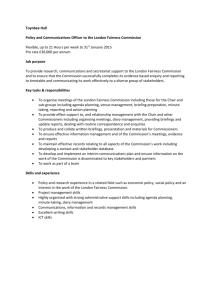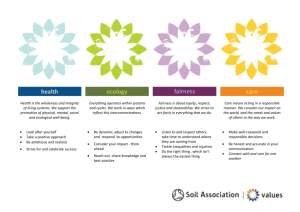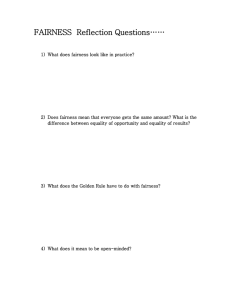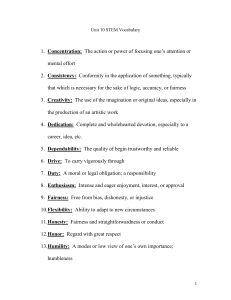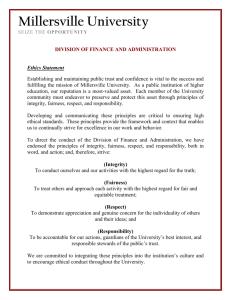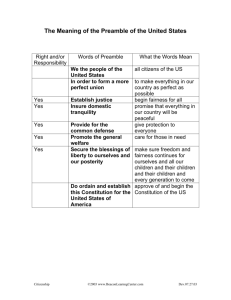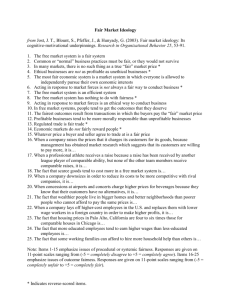Introduction to Managerial Decision Making
advertisement
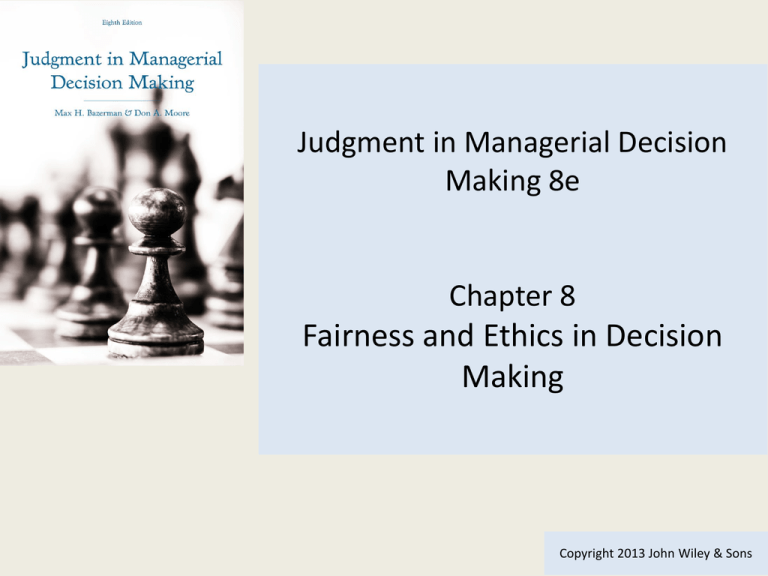
Judgment in Managerial Decision Making 8e Chapter 8 Fairness and Ethics in Decision Making Copyright 2013 John Wiley & Sons Accepting a Job Offer You are graduating from a good MBA program. Subsequent to your discussions with a number of firms, one of your preferred companies makes you an offer of $110,000 a year, stressing that the amount is not negotiable. You like the people. You like the job. You like the location. However, you find out that the same company is offering $120,000 to some graduating MBAs from similar-quality schools. Will you accept the offer? Price Increases Hurricane Katrina hits southern Louisiana, leaving many people homeless. For commodities such as building materials, demand is up and supply is down. This is a condition that leads economists to predict an increase in prices. In fact, in the aftermath of the hurricane, a small building-supply company more than doubles its prices on many items that are in high demand, such as lumber. Are the price increases ethical? Are they rational? Supply and Demand A hardware store has been selling snow shovels for $15. The morning after a large snowstorm, the store raises the price to $20. Framing and Fairness A company is making a small profit. It is located in a community experiencing a recession with substantial unemployment but no inflation. Many workers are anxious to work at the company. The company decides to decrease wages and salaries 7 percent this year. A company is making a small profit. It is located in a community experiencing a recession with substantial unemployment and inflation of 12 percent. Many workers are anxious to work at the company. The company decides to increase wages and salaries 5 percent this year. Framing and Fairness A shortage has developed for a popular model of automobile, and customers must now wait two months for delivery. A dealer has been selling these cars at list price. Now the dealer prices this model at $200 above list price. A shortage has developed for a popular model of automobile, and customers must now wait two months for delivery. A dealer has been selling these cars at a discount of $200 below list price. Now the dealer prices this model at list price. When We Resist “Unfair” Ultimatums • People often reject profit opportunities • Fairness considered in offers • Fair dictators? – Dictators often allocate to others – Pay-what-you-want pricing • The persistent desire for fairness – Based on emotions – Cross-cultural – Fairness in primates When We are Concerned about the Outcomes of Others • Pay differentials – Pay equity and product quality – Pay equity in MLB teams – CEO pay differential and performance • Others’ outcomes as reference points – Acceptability ratings versus choice behavior – Joint versus separate evaluation Perverse Consequences of Equality Norms You visit a car dealer and go on a test drive. You return to the salesperson’s cubicle in the showroom, ready to do a deal. The car has a list price of $18,000. After a short discussion, you offer $15,500. The salesperson counters with $17,600, you counter with $16,000, he counters with $17,200, you counter with $16,400, and he reduces his price to $16,800. You act as if you will not make another move and threaten to visit another dealership. The salesperson then says earnestly, “You look like a nice person, and I can see that you really like the car. My main concern is that you get the car that you want. I assume that you are a reasonable person, and I want to be reasonable. How about if we split the difference— $16,600?” Why do Fairness Judgments Matter? • People punish unfair behaviors – Third parties in dictator games – Satisfaction from punishing unfair behavior • Accounting for others’ fairness perceptions Bounded Ethicality • • • • • • Overclaiming credit In-group favoritism Implicit attitudes Indirectly unethical behavior Pseudo-sacred values Conflicts of interest Overclaiming Credit • Overestimating our contributions – Spouses and household work – Joint ventures • Reducing overclaiming by considering others In-Group Favoritism • Favoring similar others • Indirect discrimination – Positive characteristics – Social norm enforcement • Consequences – Loans – Legacy admissions Implicit Attitudes • Unconscious prejudice • The IAT • Implicit attitudes predict actual behavior – Females and social skills – Nonverbal behaviors – Spontaneous versus deliberative behaviors • Lowering prejudice in society Prescription Drug Prices Imagine that a major pharmaceutical company is the sole marketer of a particular cancer drug. The drug is not profitable, due to high fixed costs and a small market size, yet the patients who do buy the drug depend on it for their survival. The pharmaceutical company currently produces the drug at a total cost of $5/pill and only sells it for $3/pill. A price increase is unlikely to decrease use of the drug, but will impose significant hardship on many users. How ethical would it be for the company to raise the price of the drug from $3/pill to $9/pill? Prescription Drug Prices Now imagine that, instead of raising the price, the company sold the rights to produce the drug to a smaller, lesser-known pharmaceutical company. At a meeting between the two companies, a young executive from the smaller firm says: “Since our reputation is not as critical as yours, and we are not in the public’s eye, we can raise the price five fold to $15/pill.” Would selling the manufacturing and marketing rights to the other firm be more or less ethical? Indirectly Unethical Behavior • Impression management • Protection of self-perceptions When Values Seem Sacred • Sacred versus secular tradeoffs – Paying for sex – Paying for organs – Paying for babies • Emotions often precede assessments The Psychology of Conflict of Interest • Conflicts of interest bias decisions • Disclosure increases bias • Motivated blindness – – – – Financial analyst recommendations Major League Baseball and steroids Molestation in the Catholic Church Credit-rating agencies • Addressing conflicts of interest – Eliminate them – Disclosure is not the solution – Recognize your susceptibility to bias
